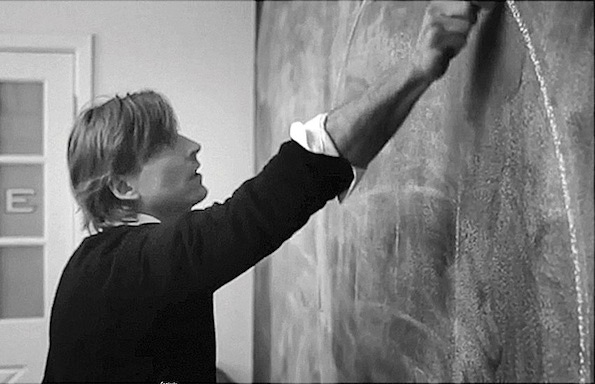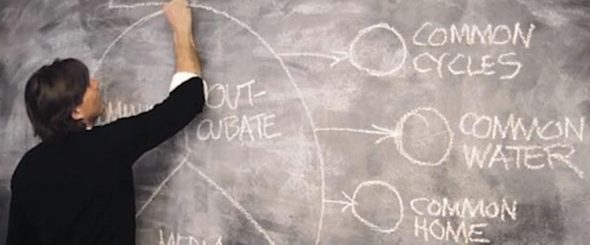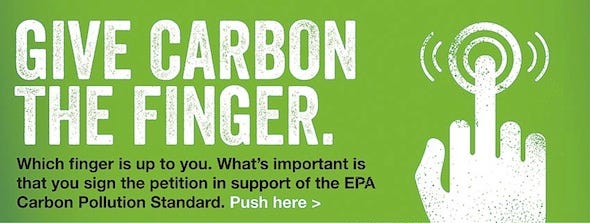Organic Connections, the magazine for Natural Vitality, caught up with this ad executive turned consumer-health advocate.
February 12, 2013

 Alex Bogusky once lived a life right out of a modern-day Mad Men. He was an advertising executive—a partner at the leading agency Crispin Porter + Bogusky—at the top of his game, with clients such as corporate giants Burger King, Coca-Cola (for Coke Zero) and VW, as well as being the creative mind behind the original launch of the Mini Cooper in the US. In 2010, Adweek magazine named him Creative Director of the Decade, and he has been referred to as “advertising’s Elvis” and “perhaps the most influential figure in American advertising today.”
Alex Bogusky once lived a life right out of a modern-day Mad Men. He was an advertising executive—a partner at the leading agency Crispin Porter + Bogusky—at the top of his game, with clients such as corporate giants Burger King, Coca-Cola (for Coke Zero) and VW, as well as being the creative mind behind the original launch of the Mini Cooper in the US. In 2010, Adweek magazine named him Creative Director of the Decade, and he has been referred to as “advertising’s Elvis” and “perhaps the most influential figure in American advertising today.”
But a change in his life produced a radical shift in Bogusky’s thinking. Now he is bringing his considerable talent to bear on behalf of sustainability, health, and full transparency in business. Bogusky told Organic Connections.
If you grew up in advertising in my era, you grew up around the idea of ‘story. All brands are a ‘story.’ And the story was pretty much always fictional. You still see that out there. The one that I think of right away is ‘Coke Equals Happiness.’ That’s an extraordinarily fictional story. I think that within the next few years it will be as funny as ‘More doctors recommend Camel cigarettes than any other brand.’ When people originally heard that, it didn’t trigger mockery or laughter; but culture changes, and things that seemed reasonable at one time don’t seem reasonable anymore. The best brands give you a real-time accurate picture of what the company is all about. What are they really doing right now? It means full transparency, because we’re going to have the tools, such as social media, to figure that out anyway. So I’d say we’re seeing the sun setting on this idea of brands being fictional stories, and in my view, none too.
The Change
It was two years ago that Bogusky took a different turn, thanks in part to his new place of residence.
A few things converged. One of them was that I had moved to Boulder about five years earlier. Boulder really has an effect on you, and that environment exposed me to a lot about food and our world that I hadn’t been exposed to before. I was ready to just make a change, to try some things that were more in line with my values; because I’ve always felt when your values and your work are aligned, that’s when you are really effective. And I had had that most of my career, but not at the end.”
And where had those values run into conflict?
Probably mostly around food. I had been watching the obesity epidemic evolve. In my way of thinking, for a time, it was all about portion control, with maybe some of it attributable to exercise. I actually wrote a diet book four years ago called The 9-Inch “Diet,” all about portion control, ‘portion distortion’—kind of an ad guy’s view of why we’re not able to manage our portions. The basic message was that no one is to blame; we’re very susceptible to getting confused because of our human design. But I started to realize that it wasn’t just the amount, it was also what we were eating. The very simple basic ingredients from when I was a young man weren’t the same; the number of food additives and the amount of genetically modified food that we were consuming had changed radically over probably the last 15 years. That correlation made me very suspicious. That’s where I began to feel like, boy—I grew up on fast food, ate a lot of fast food, but I don’t think the fast food that I ate is actually the equivalent of what you might pick up at a restaurant or the grocery store today.
Insurgents’ clubhouse
In 2010 Bogusky and his wife, Ana, opened a new firm in Boulder. They called it FearLess Cottage—an informal clubhouse for insurgents in a new consumer revolution. Immediately Bogusky became engaged in issues more aligned to his newfound values. “Pretty much the first guy who called me was Al Gore,” Bogusky said. “We worked on some advertising to debunk the myth of clean coal, which was pretty successful. I’ve been working a bunch on climate, but everything around sustainability is fascinating to me.
More recently I helped some old friends from CP+B start an agency called Made Movement, which is about the resurgence of manufacturing here in the US. I think a lot of what concerns us about the way things are made—whether it’s exploitation of workers, lead paint, safety concerns or dumping things in rivers—could be solved by bringing manufacturing back to the US. We do a leaner, cleaner kind of manufacturing here. So, as somebody who does care about sustainability, I view ‘Made in America’ in a different manner than others: I find it’s a way into sustainable manufacturing and less exploitation of workers that everybody agrees with.
Changing corporate behavior

In the overall changing landscape of the corporation-consumer relationship, Bogusky sees the consumer’s role quite differently than in the past. “I’ve felt for the last few years that there truly is this window of opportunity,” he said. “Because of the Internet and what happens online with transparency, there’s an opportunity for consumers to really change corporate behavior.
Having been on the corporate side for most of my life, I notice that corporations are very good at working to keep government out of their business—to push off regulation, to lobby to get the things that they want. I believe they are more powerful than government now. But when consumers think anything, the corporations really react, because they have to. I don’t know whether consumers realize it, but with that corporate desire to get the dollar, they have enormous power. We have to move toward viewing ourselves in line with the way the world works now. We have to think of ourselves as ‘consumer-slash-citizens.’ A lot of people don’t even like to consider themselves ‘consumers’; but I always say, ‘If you’re not a consumer, prove it and stop breathing.’ We all consume—that’s a reality. We think of ourselves as voting at the polls, but we also vote with every dollar. We should leverage this moment to use social media to make sure that we amplify everything we feel about what we want to buy, the company we want to buy from, and what our expectations are for them. We have potentially a very transformational time right now. I do worry a little bit that the window is not open forever; whether it’s SOPA [Stop Online Piracy Act] or other things, there are forces at play to corporatize the web. If that happens, we’ve likely missed our opportunity.
Conscious Consumer Rights
Bogusky has created a “Conscious Consumer Bill of Rights,” which takes the consumer’s elevated role into account. The bill includes the right to be protected against the marketing of goods and services that are hazardous to health, life or the safety of our future. It calls for the right to be protected against fraudulent, deceitful or misleading information, and to allow for unrestricted access to the complete information needed to make an informed choice. It also asserts the consumer’s right to be heard, so that consumer interests receive full and sympathetic consideration in the formulation of government policy.
Part of the empowerment of consumers is education. Over a million people have now seen a video Bogusky produced for the Center for Science in the Public Interest called The Real Bears—a parody utilizing characters similar to those from a popular series of Coca-Cola ads to tell the actual story of soda and its extreme negative health effects. Bogusky pointed out:
At its most basic, we’re trying to get people to understand soda’s relationship to American health,” Bogusky pointed out. “It’s not inherently sexy or entertaining, so the goal was to create something that was entertaining enough yet still slipped in a whole bunch of facts and figures about what’s really going on; also something that people felt was good enough for them to want to share it, because people don’t generally share the bad stuff that much—there has to be some hope. Shortly after it launched, we saw over a million views, so people obviously have shared it. We’re not done—I think we’ll keep the characters alive and keep pushing it out there.
In another effort to educate consumers, Bogusky created a series of popular video ads in support of California’s Proposition 37—the Mandatory Labeling of Genetically Engineered Food Initiative. One of these ads had an all-star cast including Danny DeVito, Emily Deschanel, Glenn Howerton, Kaitlin Olson, KaDee Strickland and Kristin Bauer van Straten.
Cardboard Wisdom
It is evident that Bogusky has a unique way of looking at the world. As an example, he’s found innovative creativity in the cardboard signs being held by people at intersections and freeway ramp exits and entrances. Boguksy said:
When you’re living on the street, the effectiveness of your communication matters. Here in Boulder I began to notice signs that were creative and sometimes funny. Was this something new? Was it effective? I decided that as a fan of creativity I would buy the signs that moved me—it would be how I decided to give or not. This is an ongoing dialogue through windshields across the country between those that have slipped through the cracks and those who are still hanging on. I can’t help but wonder, why does that sign say what it does? Why do the same themes and sometimes the exact same words crop up on signs a thousand miles apart?
Bogusky now carries with him cardboard and markers so that the signs he purchases can be replaced. In talking with the people who made them, he has also discovered a lot about the types of individuals out there—and that much of what he’d heard and read didn’t hold true. “I learned that there are no two situations alike, and the idea that everybody living on the streets is there because they have mental or substance problems is a myth,” he said. “I also learned for myself that the myths that encourage us to be less generous have a cost greater than we realize.”
The Road Ahead
Bogusky has not entirely turned his back on the big corporations he used to have as clients, but he prefers the flexibility of smaller ventures. “I tend to like to work with smaller companies simply because if you’re a big company, you’re big because you think with the existing model. You don’t want change, as change doesn’t usually mean good things if you’re really big. Things are pretty good exactly the way they are; and if the big companies could just leave them the way they are, they’d be happiest.
But if they asked for my help, I would say—and it’s really not very complicated, and whether you are Patagonia or Wal-Mart I think it works equally well—you look at your business and you ask, ‘What would we most not want to see a lot of news stories about, regarding the way we do things?’ You identify what that is, then you make a plan to at least partially address it. It doesn’t have to get you to the finish line—it just has to be the beginnings of ‘This is how we think we could begin to fix this.’ Then you take the problem and the solution to your consumers. I think the ‘Footprint Chronicles’ that Patagonia did is one of the first and best examples of that. But there are a lot of others.
(The Footprint Chronicles is a campaign being conducted by Patagonia, showing the exact locations, routes and environmental impacts associated with the manufacture of their clothing line.)
For Bogusky the change in his life is permanent, and he has found his way. “I don’t know if it happens to everybody, but when I work on some of these issues I can get very depressed,” he said. “I start to develop these theories of what change might look like and model those out in my head; and then what’s happening day to day doesn’t seem to match that, and it’s hard to see progress. I was thinking about theories of change and past great changes that I can recall, and what I’ve realized is that no one predicted that the Cold War would end with people just smashing the Berlin Wall with sledgehammers. And no one predicted that technology and ideals would converge to create the Arab Spring.
So I don’t think we really know what change is going to look like, regardless of how much we theorize about those outcomes. The reality of how we change is way too complicated; it’s almost like chemistry. The thing that I know is that part of all positive change is the opening up of dialogue. Where I believe I can work best is in that space: making sure that people learn about things that they wouldn’t learn about, and/or making sure that people are not intimidated by anybody else to not talk about things they want to talk about. It’s actually proven that if we have open dialogue, we’re a continually improving society and culture. When people try to stop that, they can stop it for a time but they can’t stop it forever. So how I want to work is not think about what happens, only think about, ‘Hey, is this a space where there is more for people to know? Is this a space where people are being intimidated and made afraid to say what they really think?’ Those are the places that I’d like to help out, and let other people figure out what actually happens.
To dig deeper, check out www.fearlessrevolution.com.
And read more at organiconnectmag.com
About the Author(s)
You May Also Like




